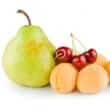Background
- Nitriloside is a generic term for beta-cyanophoric glycosides, a large group of water-soluble, sugar-containing compounds found in a number of plants. Amygdalin (also called laetrile), is one of the most common nitrilosides. Amygdalin is found in the seeds of many fruits, particularly apricots, as well as in grains and grasses.
- A patented form of the compound, also called Laetrile®, is a partly man-made molecule and shares only part of the amygdalin structure. Both Laetrile® and amygdalin have been promoted and sold as "vitamin B-17", although neither compound is a vitamin.
- Chinese medicine practitioners have used apricot seed as a treatment for respiratory diseases, including bronchitis and emphysema. It is believed to suppress coughs and to help remove mucus. The oil has also been used as a laxative. Small amounts are said to stimulate breathing, improve digestion, and give a sense of well-being. It has also been used to treat rheumatic disease in Germany and high blood pressure in both Germany and the United States.
- Laetrile® has been used as a cancer treatment. It was first used for this purpose in Russia in 1845 and later in the United States and Mexico. More recently, the American Cancer Society (ACS) has stated that the use of Laetrile® or amygdalin to treat cancer is not supported by the available scientific evidence. The ACS warns that these compounds may be converted to cyanide in the body. A number of cases of cyanide poisoning associated with Laetrile® have been reported. The National Institutes of Health (NIH) has similarly reported that clinical evidence has shown laetrile to be of little benefit against cancer and that its side effects resemble those of cyanide poisoning.
- Laetrile® and amygdalin are not approved by the U.S. Food and Drug Administration (FDA) as a treatment for cancer.
References
- Bromley J, Hughes BG, Leong DC, et al. Life-threatening interaction between complementary medicines: cyanide toxicity following ingestion of amygdalin and vitamin C. Ann Pharmacother 2005;39(9):1566-1569.
View Abstract - Davignon JP, Trissel LA, Kleinman LM. Pharmaceutical assessment of amygdalin (Laetrile) products. Cancer Treat Rep 1978;62(1):99-104.
View Abstract - Greenberg DM. The case against laetrile: the fraudulent cancer remedy. Cancer 1980;45(4):799-807.
View Abstract - Milazzo S, Ernst E, Lejeune S, et al. Laetrile treatment for cancer. Cochrane Database Syst Rev 2006;(2):CD005476.
View Abstract - Milazzo S, Lejeune S, Ernst E. Laetrile for cancer: a systematic review of the clinical evidence. Support Care Cancer 2007;15(6):583-595.
View Abstract - Moertel CG, Ames MM, Kovach JS, et al. A pharmacologic and toxicological study of amygdalin. JAMA 1981;245(6):591-594.
View Abstract - Moertel CG, Fleming TR, Rubin J, et al. A clinical trial of amygdalin (Laetrile) in the treatment of human cancer. N Engl J Med 1982;306(4):201-206.
View Abstract - No authors listed. Unproven methods of cancer management. Laetrile. CA Cancer J Clin 1991;41(3):187-192.
View Abstract - Osterberg S. [Dangerous to eat: apricot seed preparation]. Lakartidningen 1978;75(39):3438.
View Abstract - Rauws AG, Olling M, Timmerman A. The pharmacokinetics of amygdalin. Arch Toxicol 1982;49(3-4):311-319.
View Abstract - Rauws AG, Olling M, Timmerman A. The pharmacokinetics of prunasin, a metabolite of amygdalin. J Toxicol Clin Toxicol 1982;19(8):851-856.
View Abstract - Rubino MJ, Davidoff F. Cyanide poisoning from apricot seeds. JAMA 1979;241(4):359.
View Abstract - Sadoff L, Fuchs K, Hollander J. Rapid death associated with laetrile ingestion. JAMA 1978;239(15):1532.
View Abstract - Suchard JR, Wallace KL, Gerkin RD. Acute cyanide toxicity caused by apricot kernel ingestion. Ann Emerg Med 1998;32(6):742-744.
View Abstract - Tlirnoveanu C, Popescu E, Negulescu I, et al. [Study of acute poisonings with cyanogenetic substances (apricot seed kernels)]. Rev Pediatr Obstet Ginecol Pediatr 1982;31(3):249-252.
View Abstract







